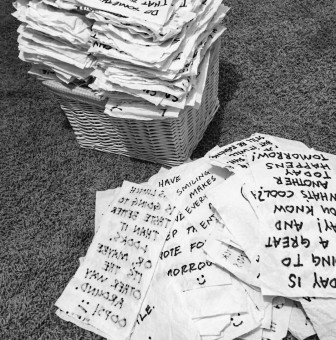At Children’s Hospital, a Note with Lunch
Patients at Children’s Hospital of Alabama now get a little extra pick-me-up. Every day, kids there receive a note with their lunches. These notes are called napkinisms. The project sprung from a local writer, who spent years writing lunchbox notes for his own children.
Just about every morning, Billy Ivey hand-writes a note for each one of his five kids. Using a Sharpie, he scribbles down a witty joke or a simple “I love you” on a paper towel. Then he adds it to their school lunch. Ivey’s been doing that for over a decade.
“Couple years ago,” Ivey says. “I wrote a note that I thought was particularly funny and I took a picture of it.”
Ivey posted the picture to social media.
“It said, ‘Remember, every time you smile, a mean kid gets diarrhea.’ And people, again, people couldn’t believe that I would write something like that to my kid, but the purpose of it was to make my kids laugh, to surprise them with something in the middle of their day.”
That idea resonated with people. Ivey started calling the notes “napkinisms.” He created a website and has a dedicated following on social media. Starting this year, kids at Children’s Hospital of Alabama are getting their own napkinisms. Every day, patients receive one of Ivey’s notes, printed onto postcards and passed out at lunchtime.
Six-year-old patient Blaklee Tew enjoys it. He picks up one of the napkinisms and reads it aloud.
“Potato chips are vegetables,” Tew reads. “Just go with it.”
Tew laughs, because he says potato chips do not count as vegetables.
Garland Stansell, head of communications for Children’s Hospital, helped launch the napkinisms partnership. He says the idea is simple.
“That somebody wrote a personal message, somebody’s thinking about you,” Stansell says. “Somebody cares that you’re here.”
And it never hurts to make a patient smile. Stansell says napkinisms is set to continue indefinitely, with plans to give staff the opportunity to write their own notes for the kids.
Outside of the hospital, anyone can join in and submit an idea on the napkinisms website. Billy Ivey says just a few words can go a long way.
“That’s where the power of this comes, you know,” Ivey says. “It’s not my responsibility to change the world or change somebody’s life, but I do have an opportunity to change somebody’s day, on a daily basis.”
Ivey says since starting the program at Children’s Hospital, there’s been an increase in public submissions on the napkinisms website. He says some of those notes may eventually wind up on patient lunch trays.
Bill making the Public Service Commission an appointed board is dead for the session
Usually when discussing legislative action, the focus is on what's moving forward. But plenty of bills in a legislature stall or even die. Leaders in the Alabama legislature say a bill involving the Public Service Commission is dead for the session. We get details on that from Todd Stacy, host of Capitol Journal on Alabama Public Television.
My doctor keeps focusing on my weight. What other health metrics matter more?
Our Real Talk with a Doc columnist explains how to push back if your doctor's obsessed with weight loss. And what other health metrics matter more instead.
Baz Luhrmann will make you fall in love with Elvis Presley
The new movie is made up of footage originally shot in the early 1970s, which Luhrmann found in storage in a Kansas salt mine.
Forget the State of the Union. What’s the state of your quiz score?
What's the state of your union, quiz-wise? Find out!
A team of midlife cheerleaders in Ukraine refuses to let war defeat them
Ukrainian women in their 50s and 60s say they've embraced cheerleading as a way to cope with the extreme stress and anxiety of four years of Russia's full-scale invasion.
As the U.S. celebrates its 250th birthday, many Latinos question whether they belong
Many U.S.-born Latinos feel afraid and anxious amid the political rhetoric. Still, others wouldn't miss celebrating their country








